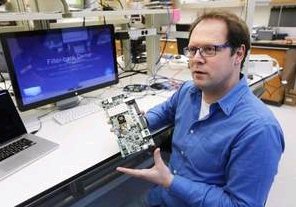
At Purdue, researchers are developing a computer chip that would enable smartphones and other devices to identify objects much like the human brain does. A start-up around the technology has just been launched. Led by Eugenio Culurciello, associate professor at Purdue’s Weldon School of Biomedical Engineering, the research team has created the “nn-X” chip, giving computers the ability to recognize and differentiate different objects, images, and videos.
To illustrate, a car equipped with the nn-X chip could tell which part of the scene is a drivable road and not an off-limits sidewalk. This could drastically improve driver technology and might pave the way for advancements in driverless vehicles.
“Right now computers are not exactly smart at understanding the content of images and videos,” says Culurciello. “They see numbers, but they don’t know what’s in the picture.” The new chip could also be used to better classify photos or video clips, allowing users to browse and sort more easily. This would be ideal for security camera systems that record hundreds of hours of video.? “Wouldn’t it be great,” says Culurciello, “if the computer could parse the video by itself and then tell you, ‘I saw a couple suspicious people I’ve never seen before and here are their pictures. They were around your house.’”
This kind of capability already exists, such as Internet image searches that categorize images by keywords, but never has such technology been placed in a smartphone or put in a security camera[…]
Source: techtransfercentral.com
